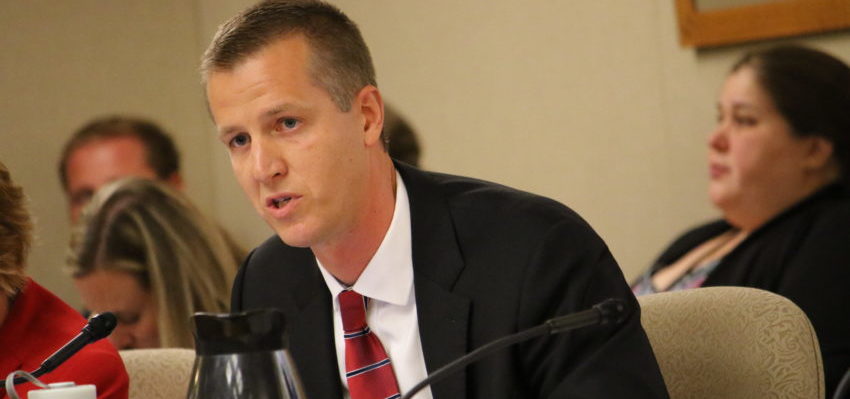 [bctt tweet=”Republicans led by @DaleKooyenga are working on a $200 million tax cut plan – the same income-tax relief package scrapped from @GovWalker’s budget proposal last year. #wiright #wipolitics ” username=”MacIverWisc”]
[bctt tweet=”Republicans led by @DaleKooyenga are working on a $200 million tax cut plan – the same income-tax relief package scrapped from @GovWalker’s budget proposal last year. #wiright #wipolitics ” username=”MacIverWisc”]
MacIver News Service | Feb. 16, 2018
By M.D. Kittle
MADISON, Wis. – Republicans are working on a $200 million tax cut plan – the same income-tax relief package scrapped from Gov. Scott Walker’s budget proposal last year.
“The way to think about the whole thing is there were changes at the federal level, and we have a buffet in front of us on what do we want to adopt at the state level,” Kooyenga said.
The plan, proposed by state Rep. Dale Kooyenga (R-Brookfield) would be mostly paid for by a “buffet approach” to conforming with the federal tax reform law approved late last year.
“The way to think about the whole thing is there were changes at the federal level, and we have a buffet in front of us on what do we want to adopt at the state level,” Kooyenga told MacIver News Service Friday.
Walker’s plan included cutting Wisconsin’s two lowest income tax rates slightly – by a tenth of a percentage point – to 3.9 percent and 5.74 percent. A median income family of four earning about $86,000 annually would save about $139 over the biennium.
The Legislature jettisoned Walker’s proposal, which would have saved taxpayers a combined $203 million over two years. Kooyenga’s plan basically picks up Walker’s.
Kooyenga and Sen. Howard Marklein (R-Spring Green), both CPAs, have been working on a tax conformity package that would line up Wisconsin’s tax code with the many changes made in the federal tax reform law. Doing so will create less confusion for filers and the government, the lawmakers say.
But arriving at the tax cut will take a little picking and choosing on the conformity buffet.
The plan calls for adopting all of the federal tax changes, with the exception of four.
While popular, the state cannot afford adding the federal deduction for pass-through business income, Kooyenga said. Not conforming with the federal change will pump in $242.5 million more in revenue this year and $161.8 million next year than would have been the case had the state conformed to the federal change, according to a Legislative Fiscal Bureau memo.
Kooyenga’s plan also would not include adoption of the federal bonus deduction change, which would mean $241.1 million more for the state coffers this year and $110 million in 2019.
Correspondingly, the tax revenue gain for the state is a tax loss for businesses, which would experience a tax cut if the state conforms to the federal change.
On the flip side, filers would save $78 million in the first year, $69 million in the next, by Wisconsin not conforming to the federal change limiting interest deductions to 30 percent of adjusted taxable income. It’s a highly unpopular measure in the federal tax reform package, Kooyenga said.
Kooyenga gets to a net $90 million or so in revenue each year after factoring in revenue gained and lost in conforming – and not conforming in certain instances – to the federal tax changes. It’s admittedly complicated, but at the end of the day the state is estimated to take a combined $180 million more in tax revenue, which Republicans would then send back to taxpayers in the form of tax cuts.
“If you were a Democrat, you would take that money and spend it on a bunch of stupid stuff…We say, why not take that $90 million and adopt the governor’s tax cut idea that we ditched,” Kooyenga said.
“If you were a Democrat, you would take that money and spend it on a bunch of stupid stuff,” the lawmaker said. “We say, why not take that $90 million and adopt the governor’s tax cut idea that we ditched.”
The state would chip in an additional $10 million per year to get to the $200 million tax cut number over the biennium. And the reduction would remain in place – at the will of the Legislature.
Kooyenga said the tax package, as it stands now, would be combined with Walker’s proposed child tax credit – rebate checks that would be sent out later this year – and a proposed sales tax holiday in August. Walker proposes a $100-per-child tax credit for parents with children under 18 who live at home.
A spokeswoman from the governor’s office said the administration is reviewing the plan.
“We thank these legislators for developing the proposal,” said Walker spokeswoman Amy Hasenberg.
Above all, Kooyenga said, state tax conformity with the federal changes is critical. If the state doesn’t act, Wisconsin filers will have to deal with twice the tax requirements, creating confusion and additional preparation costs.
Some of the existing tax breaks may seem absurd to the average taxpayer.
For instance, one of the federal changes ends the practice of taxpayers being able to write off things like the cost of Milwaukee Bucks tickets. Beyond the question of tax breaks for watching NBA games, is paperwork problems created if the state doesn’t adopt the federal change. Of course, the same complexity issues arguably will arise in the pass-through and Bonus Depreciation changes, if not adopted by the state.
The federal tax reform law allows taxpayers to use investments in Edvest College Savings plans for K-12 education, in parental choice programs, or with other education-related expenses. Wisconsin taxpayers would miss out on that benefit if the state doesn’t conform to the federal change.
“This is really necessary maintenance,” Kooyenga said
Listen here to Kooyenga’s interview Friday with MacIver News Service on the Dan O’Donnell Show on NewsTalk 1130 WISN.